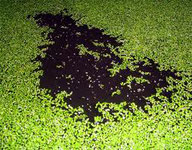How to identify and get rid of duckweed.
How to get rid of Duckweed.
- Duckweed in small ponds can be kept under control by continuous netting.
- For larger ponds, using a floating boom to sweep from end to end and then removing the mass with a large strong net works.
- Duckweed makes great compost, providing its composted away from the pond.
- Planting Waterlilies and other plants with floating leaves will also reduce the level of duckweed.
- Waterfalls and moving water, will push the weed to one end of the pond making it easier to remove from the pond.
How to prevent duckweed getting into my pond.
How to Control duckweed without using chemicals

How to Identify Duckweed:
- Stopping over feeding your fish.
- Stopping adding fertilisers for pond plants, they don't need it, fish, frogs, newts all pooh in your pond, providing all the fertiliser your pond plants need to keep them healthy.
IT Works, I know!
Reduce nutrients in the pond.
Is Duckweed a problem for my garden pond
On the label it says "eco friendly" and "frog friendly" and "contains selected bacteria" and "suitable for use in all types of ponds". It doesn't have a list of active ingredients, though it does say "wash hands after use" and "keep out of reach of children".
- Stopping over feeding your fish.
- Stopping adding fertilisers for pond plants, they don't need it, fish, frogs, newts all pooh in your pond, providing all the fertiliser your pond plants need to keep them healthy.
IT Works, I know!

A read for rainy days
In fairy tales, there is always a
Prince Charming and a bad man. Sometimes in real life, Prince Charming is the bad man, or the
bad man turns out to be Prince Charming.
Please be aware, this is not a fairy tale. This book contains references to grooming gangs, sexual abuse, Gaslighting, and punishment of the abusers. Also NON-WOKE scrutiny of British
society.
A dark story of gaslighting, sexual abuse, retribution, and hope. Based on the author's conversations with Willow, a young girl hidden from Society, and with Richard an ex-soldier now working for
a covert agency The Organisation. This book tells how Richard confronts those in authority blocking Willow from the therapy she needs to escape from them and recover, he’s aware of the
consequences. But having ignored evil too often, he’s ready for the risks.
CLICK LINK FOR FREE READ SAMPLE Kindle version Paperback
Writing your first book or novel? This new website provides advice and tips to help write, edit, publish, market and promote it https://www.faircop.com/
